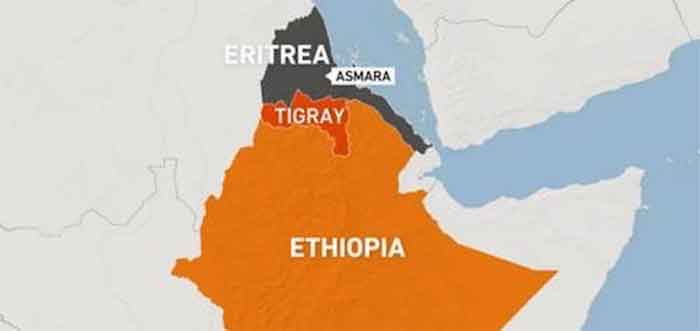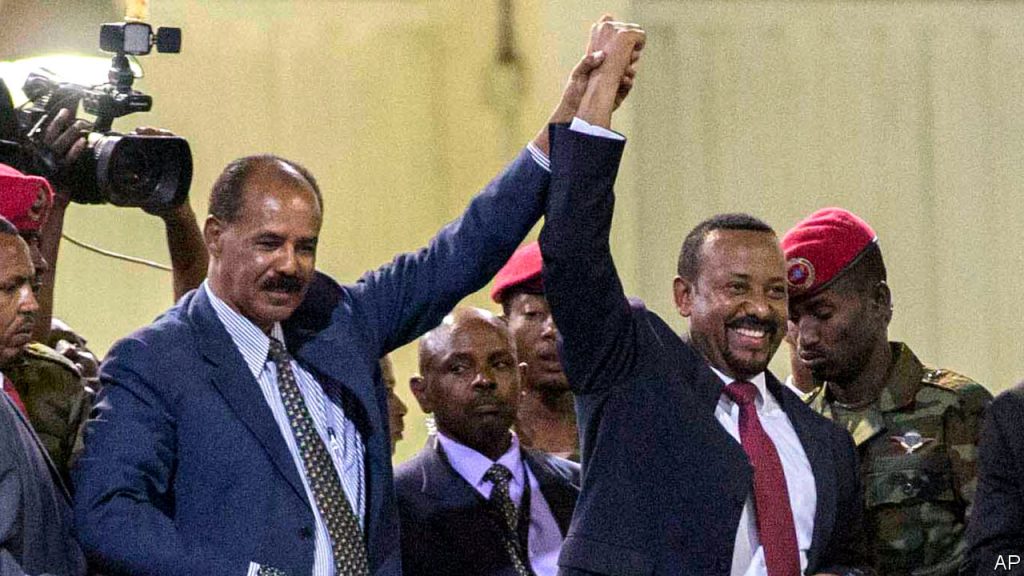At least 20 Sudanese troops have reportedly died following clashes with Ethiopian forces on the countries’ shared border.
Media reports from the conflict area said:
Sudanese soldiers fell into an ambush on Saturday after traveling across the Atbara river and being bombarded.
However, Sudan’s army released a statement on Saturday reporting that it delivered “heavy losses of life” against Ethiopian troops and militias who assaulted them. The Sudanese army also said it saw fatalities, but did not disclose how many.
The deadly clashes occurred after more than a year of conflict in al-Fashqa, an area that touches both Sudan and Ethiopia and produces cotton and sorghum. The patch of land is seen as a potentially explosive area amid simmering conflict between the countries.
Sudan and Ethiopia are already fighting over the latter’s intention to fill and run a large hydroelectric dam on the main side stream of the Nile River.
Both countries are also experiencing internal conflicts.

Tigray
The government in Ethiopia is still battling Tigray rebels in fighting that has caused thousands of deaths and forced thousands more from their homes.
Ethiopia’s army captures northern Afar town of Chifra
From Addis Ababa, Reuters reported:
Ethiopia’s army has retaken the town of Chifra in Afar region, its first major seizure from rebellious Tigrayan forces since Prime Minister Abiy Ahmed appeared on the frontlines two days ago.
The Tigray People’s Liberation Front (TPLF) captured Chifra, on the border between the northern Afar and Amhara regions, after fighting intensified last month between Ethiopian troops and forces loyal to the TPLF.
Chifra is west of the town of Mille, which Tigrayan forces have been trying to capture for weeks, because it lies along the highway linking landlocked Ethiopia to Djibouti, the Horn of Africa’s main port.
Abiy was on the frontline with the army fighting the Tigrayan forces in Afar.
“The morale of the army is very exciting,” he said in the remarks broadcast on Friday, promising to capture Chifra town “today”.
It is a major seizure from rebellious Tigrayan forces since Prime Minister Abiy Ahmed appeared on the frontlines two days ago.
“Ethiopian Defense Forces and Afar Special Forces have controlled Chifra,” the Ethiopian Broadcasting Corporation said on its Twitter account.
Thousands of civilians have been killed and millions displaced by fighting since war erupted in Tigray last November.
Blinken calls for ceasefire as Abiy pledges to destroy rebels
On Saturday, the U.S. State Department said Secretary of State Antony Blinken was concerned about escalating violence in Ethiopia and called for negotiations to address the crisis there.
Secretary Blinken expressed grave concern about worrying signs of military escalation in Ethiopia
Ethiopian Prime Minister Abiy Ahmed said his soldiers would “destroy” rebels from the northern Tigray region.
“You are comprehensively destroying the enemy. There is no going back without winning,” Abiy, winner of the 2019 Nobel Peace Prize, said in a 34-minute clip posted to his office’s Twitter page on Saturday.
“We will win, the enemy is dispersing, there are areas we have to control,” he said.
“Until we destroy the enemy. There is no rest.”
The country’s most famous distance runner, Haile Gebreselassie, told AFP he was determined to “sacrifice and stand for Ethiopia”.
The TPLF, he said, “is destabilizing our country beyond its region”.
The TPLF has aligned itself with other armed groups, including the Oromo Liberation Army, which is active in the Oromia region surrounding the city.
Abiy also said the military had secured control of Kassagita.
The war started in November 2020, when Abiy sent troops into Tigray to topple the TPLF in response, he said, to TPLF attacks on army camps.
Olusegun Obasanjo, the African Union’s special envoy for the Horn of Africa, is leading a diplomatic effort for a ceasefire, but there have been few signs of progress.
The Ethiopian government said rebel gains were overstated, blaming what it describes as sensational media coverage and alarmist security advice from embassies for creating panic.
Protesters Accuse U.S. and UK of Conspiring Against Ethiopian Sovereignty
Reports from Addis Ababa said:
Thousands of demonstrators marched on the U.S. and UK embassies in Ethiopia’s capital Addis Ababa on Thursday, raising unprecedented level of condemnation of western nations’ alleged role in the Ethiopian civil war.
The protesters demanded that U.S. President Joe Biden “revise his foreign policy”. They accused foreign countries of plotting to dismantle Ethiopia’s sovereignty.
Protesters outside the U.S. and UK embassies in Addis Ababa, waving Ethiopian flags, chanted “Stop foreign meddling” and “Stop fake news”.
The idea of Ethiopia’s historic nation dissolving has terrified Ethiopians.
There is also the question of what might happen to the Horn of Africa as a whole.
War-hit Ethiopia admonishes U.S. over security warnings
Other media reports said:
Ethiopia on Thursday accused the U.S. of spreading false information about security conditions in the war-hit country, warning such statements could harm ties.
Ethiopia’s claim highlighted growing tensions between Prime Minister Abiy Ahmed’s government and world powers that once saw him as a reformer but now voice alarm at the year-old war destabilizing Africa’s second most populous country.
Washington in particular once viewed Ethiopia as a vital security partner in the volatile Horn of Africa.
But their relationship risks hitting new lows.
On November 5, the U.S. State Department ordered the withdrawal of non-essential embassy staff because of “armed conflict, civil unrest, and possible supply shortages”, and several other diplomatic missions have followed suit. France this week joined the list of countries urging their citizens to leave on commercial flights.
This week the U.S. embassy further rankled Abiy’s government by posting a warning about the potential for terrorist attacks in Ethiopia.
“Previously they disseminated the information that Addis Ababa is surrounded [by rebels], now they are saying this false information that a terror attack will be conducted,” Kebede Desisa, a government spokesman, told a press conference for state media Thursday.
“These actions hurt the two countries’ historical relations,” he said.
The Biden administration this month announced its intention to boot Ethiopia from a key trade pact that grants duty-free access for most exports.
But it has held off on imposing sanctions against the Ethiopian government and rebels in hopes of encouraging a ceasefire.
Ceasefire Push
The African Union’s special envoy for the Horn of Africa, Olusegun Obasanjo, is leading a diplomatic push for a ceasefire, but there have been few signs of progress so far.
The TPLF wants government and allied forces to withdraw from the western section of Tigray, while Abiy’s government wants the TPLF to pull out of Amhara and Afar.
A week ago the government said it would allow 369 aid trucks into Tigray.
On Wednesday the UN humanitarian coordination office said nearly 40 trucks bearing food and other aid had left for Tigray from the Afar capital Semera.
The UN also ran its first humanitarian flight from Addis Ababa to Mekele this week since the service was suspended in October amid a campaign of government air strikes in the region.
In The Sunday Mail from Harare, Shannon Ebrahim wrote:
The hidden hand of foreign powers in the conflict of Ethiopia is just another example of the U.S. and its allies seeking regime change in a country where the government is perceived to be too independent and not subservient to foreign interests.
The opinion piece – Foreign agendas at play in Ethiopian conflict – said:
In the case of Ethiopia, it is all about safeguarding the interests of Egypt, which is livid that Ethiopia has succeeded in filling the Grand Ethiopia Renaissance Dam (GERD) without having signed binding guarantees that it would provide a guaranteed amount of water to Egypt even in drought periods.
The U.S. has a vested interest in siding with Egypt, given its role as a U.S. ally and interlocutor in the Israel/Palestine conflict.
It said:
Neither the U.S. nor the western financial institutions would fund any part of the GERD dam project and were taken aback when Ethiopia managed to fund it from its own resources.
Israel also has a direct interest in the outcome of the GERD negotiations benefiting Egypt, which had enabled the transfer of Nile water across the Sinai to the Negev desert in southern Israel.
It added:
With the government of Abiy Ahmed taking a nationalistic position on the dam and unilaterally deciding to fill it, thereby angering Egypt and Sudan, the U.S. has shifted its perception of Ethiopia, from one of staunch U.S. ally to a national security risk.
For a quarter of a century, the U.S. and western powers had backed the Tigray People’s Liberation Front (TPLF), which had overthrown the Derg regime with the help of former U.S. Assitant Secretary of State Herman Cohen in 1991. The TPLF ruled Ethiopia with an iron fist and became an authoritarian police state, jailing journalists, dissents, opposition leaders, engaging in ethnic killings and Balkanization, carrying out extra-judicial killings, and firing live ammunition on demonstrators.
Despite the brutal rule of TPLF, the U.S. never imposed sanctions on its leaders or froze their assets – quite the opposite.
It hailed the TPLF as a reliable ally and rewarded it with aid and financing for doing the U.S.’s bidding in the region.
The opinion piece said:
But in 2018, the young firebrand Abiy Ahmed rose to power in a landmark democratic election, unseating the TPLF, much to their chagrin and that of their western allies.
Despair in Ethiopia gave way to hope as Abiy reconciled Ethiopia and Eritrea, sought to reconcile ethnic groups in Ethiopia, and focused his government in fighting poverty.
The November 27, 2021 dated article said:
What did not sit well with the Americans and other powers was his pan-Africanism and determination to make Ethiopia and Africa less dependent on foreign aid and more self-reliant. These were the same sentiments that Patrice Lumumba had espoused in the Congo following independence, which led to his assassination.
Abiy’s independent policies, his determination to provide his people with electricity through the hydroelectric power of the GERD dam despite the protest of Egypt and Sudan, and his openness to close relations with China made him an unpalatable leader.
There are strong suspicions that the U.S. and its allies have been backing the TPLF rebels in their moves against the legitimate federal government, which has in the process destabilized Ethiopia.
The country is already a tinder box, given the deeply entrenched ethnic divisions and competition for resources.
The Harare-newspaper article said:
The West has never been hesitant to destabilize countries whose leaders do not serve their narrow interests, and in the case of Ethiopia, it is dangerous game that could have dangerous consequences for the stability of the whole east African region.
The American narrative on the ongoing conflict in Ethiopia has characterized the Ethiopian armed forces as having committed grave abuses of human rights, largely seizing on the propaganda of the TPLF and calling on a legitimate government to make a peace deal on equal terms with rouge sector.
What is not mentioned is that it was the TPLF that launched an unprovoked attack on Ethiopian forces based in the north of the country as they slept in their barracks on November 4 last year, and days later, massacred hundreds of women and children.
The TPLF has admitted that it was a pre-emptive strike and has since waged a fierce battle against federal forces, going as far as to enlist child soldiers.
The article said:
There is no question that grave war crimes have been committed by both sides in the ongoing conflict, but the western narrative seems to have been intentionally skewed against the Ethiopian government, which is fighting to put down an insurrection and keep the country together.
Those financing and arming the TPLF rebels in their pursuit of retaking power may end up plunging Ethiopia into a civil war that will end in massive bloodshed and starvation.















































